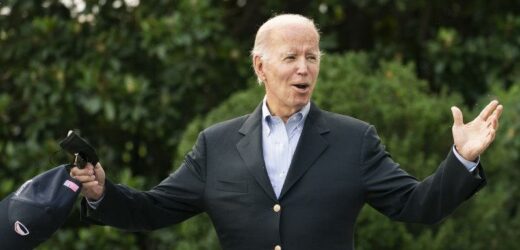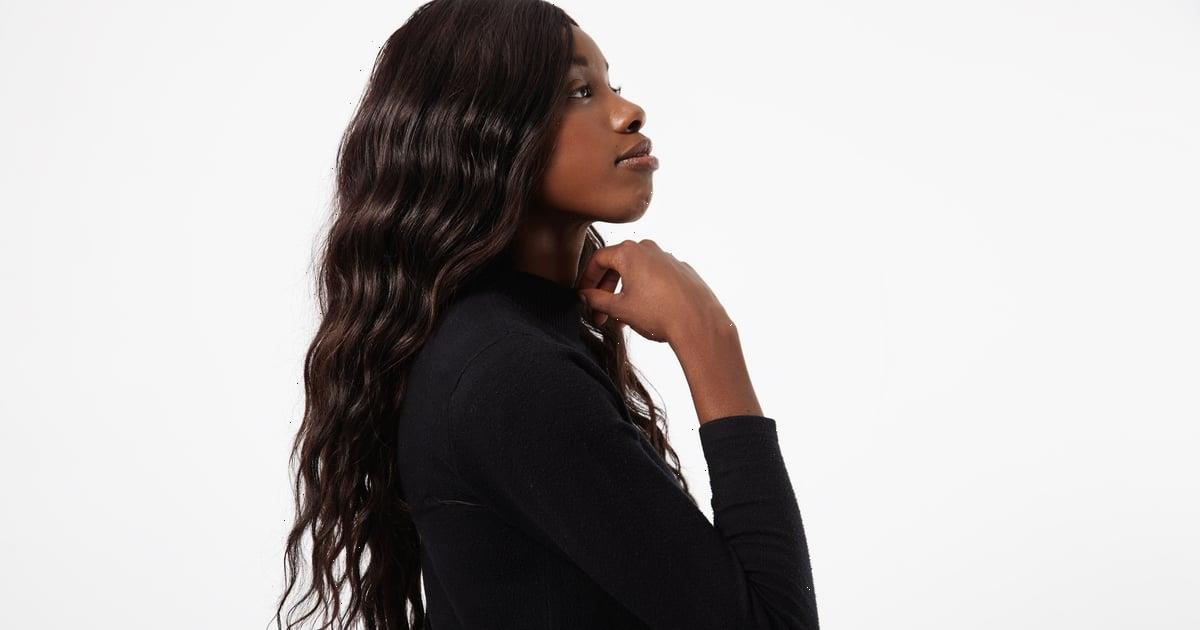Maybe it is because his 79 years have traversed so much US history, but few sitting presidents have been compared with so many of their predecessors as Joe Biden. In keeping with the journalistic tradition of assigning each new occupant of the White House a presidential soulmate from the past, commentators initially likened him to Franklin Delano Roosevelt, the Democrat he so desperately yearns to emulate. Like FDR, Biden took his oath of office at a moment of national peril, and proposed an ambitious legislative program to alleviate the crisis – in Roosevelt’s case poverty, in Biden’s the pandemic.
Joe Biden is a weak president, but a better contender for the Democrats is yet to emerge. Credit:AP
This historical honeymoon phase, however, did not last long. By the end of his first summer in the White House, much of his legislative program was stalled in Congress, while the botched withdrawal of US forces from Afghanistan accentuated the sense of America’s 21st century decline. As his approval ratings plummeted, and inflation started to soar, the 47th president was paired with the 39th, the one-term Democrat Jimmy Carter.
Since then, Biden has been likened to Gerald Ford, another president who tried to repair American democracy after it had been attacked by a flagrantly criminal predecessor, Richard Nixon. Most recently, after a string of successes in Congress, he has been cast as the new LBJ. Not since Lyndon Johnson, the argument plausibly goes, has a president amassed such a record of legislative accomplishment: a $1.9 trillion stimulus package (the American Rescue Plan), the Inflation Reduction Act (which will shore up Obamacare and curb greenhouse emissions), an infrastructure act, a much-needed boost for the US semiconductor industry, and the most significant gun control legislation in nearly thirty years. Compiling his own list of presidential antecedents, the White House chief of staff Ron Klain recently boasted that Biden had passed the biggest economic recovery plan since Roosevelt, the largest infrastructure plan since Eisenhower, confirmed the most judges since Kennedy and delivered the second-biggest healthcare bill since Johnson.
For all these historical parlour games, however, we are ultimately left with the reality of the here and now: Joe Biden is Joe Biden, a president who will almost be 82 at the time of the next election; an ageing incumbent who, despite recent successes, many in his party think should not seek a second term.
When first I saw Biden on the campaign trail in 2020, at a small town hall event before the Iowa caucus, I was shocked by how shambling he had become. His stump speech that day became a word salad. At times he spoke almost in a whisper. Frequently he lost his train of thought, especially when he spotted familiar faces in the audience which prompted him to share obscure personal reminiscences that served no political purpose.
IllustrationCredit:John Shakespeare
This campaign event came to enjoy a long afterlife on social media because of his response to my request for an interview with the BBC, which was then my journalistic home. “The BBC?” he deadpanned, “I’m Irish” – a throwaway comment, delivered with his trademark grin, that caused conniptions in Whitehall and brought on a cascade of columns about the death of the trans-Atlantic “special relationship”. What stayed with me, however, was two seemingly divergent thoughts: Joe Biden was a terrible candidate, but he nonetheless remained the best-placed Democrat to win back the trifecta of Rust-Belt states, Wisconsin, Michigan and Pennsylvania, needed to defeat Donald Trump.
Two-and-a-half years on, I find myself in the same place. For all his flaws, for all his brain fades, for all the awkward moments when he has looked like a world-weary president at the end of his second term rather than midway through his first, he remains the Democrats’ most viable candidate.
Vice-President Kamala Harris, his most obvious replacement at the top of the ticket, would be hit by misogyny and racism – misogynoir is the term that describes the double-edged discrimination against Black women. The current Transportation Secretary Pete Buttigieg, who tried in 2020 to become America’s first openly gay president, would face a barrage of homophobia, much of it cloaked in the guise of anti-wokeness. Gavin Newsom, the telegenic Governor of California, would be painted as a San Francisco ultra-liberal. Some of the other up-and-coming Democratic governors, such as the billionaire J.B. Pritzker in Illinois, are little known outside their states. Stacey Abrams, who is campaigning in Georgia to become America’s first Black female governor, is a force to be reckoned with, but she would doubtless run up against the same wall of prejudice as Vice-President Harris. Besides, which one of them could repeat Biden’s Rust Belt success?
History offers a timely guide in highlighting the dangers for the Democrats of torpedoing White House incumbents. Take 1952, when President Harry S. Truman was defeated in the New Hampshire primary by Senator Estes Kefauver, a folksy Tennessean famed for wearing a Davy Crockett-style coonskin cap. Or reach back to 1968, when Robert Kennedy and another anti-war candidate, Senator Eugene McCarthy, challenged LBJ for the Democratic presidential nomination. Truman and Johnson ended up dropping out of the race, but in both instances the Democrats fielded weaker presidential candidates, Adlai Stevenson and Hubert Humphrey, both defeated by Republicans, Eisenhower and Nixon.
The larger problem is the dearth of Democratic talent, which has come into especially sharp focus at this moment of maximum peril for democracy. Barack Obama may have been a once-in-a-lifetime politician, but this former community organiser proved to be a terrible party builder. Presumably thinking that Hillary Clinton would grasp hold of his torch, he neglected to mentor the next generation of potential leaders.
The big-name Democratic dynasties are also failing to deliver. It is now more than 40 years since a Kennedy mounted a run for the presidency, and the political fortunes of liberalism’s first family have never fully recovered from the weekend in 1969 when Neil Armstrong stepped foot on the moon. That very morning came news of Ted Kennedy’s car accident on Chappaquiddick Island, in which a young female campaign aide, Mary Jo Kopechne, lost her life.
At the height of the COVID pandemic in New York, the then-governor of the Empire State, Andrew Cuomo, another political scion, looked like a prospective president. But allegations of sexual harassment forced his resignation and quashed his White House ambitions.
The leadership of the congressional Democrats, meanwhile, has become a gerontocracy. The House Speaker Nancy Pelosi is 82. Her deputy, the House majority leader Steny Hoyer, is 83. Chuck Schumer, the Senate Majority leader, is 71, which is more than double the age of Thomas Jefferson at the time when the Declaration of Independence was penned. The ongoing domination of Baby Boomers has added to the sense of democratic decrepitness, both big “D” and small.
At the other end of the generational spectrum is the 32-year-old Alexandria Ocasio-Cortez, whose fame burns so brightly that she is known simply by her initials. But AOC is also one of the most polarising politicians in America, and radical young Democrats frighten large swathes of the electorate.
It says much about the party’s present weakness that the most effective anti-Trump spokesperson is a staunch conservative Republican with the surname Cheney.
Put simply, the Democrats have lost the knack of producing centrists – like JFK, LBJ, Carter, Bill Clinton, and Obama – who can build election-winning coalitions and carve out Electoral College victories. Hence, their over-reliance on Joe Biden.
Political soothsaying is a fool’s game, especially in a polity as crazed as America’s. Fortunes can turn on a dime. Election-altering developments, such as the overturning of Roe v Wade and the FBI raid on Mar-a-Lago, come at such a fast and furious pace. Over the next two years, Biden may well exhibit more blatant signs of cognitive decline, which would alter the political calculus. But while the powers of clairvoyance elude me, I know enough about the past to be alert to the dangers of forcing a Democratic incumbent to step aside.
Joe Biden is weak, and if he decides to seek re-election he will not be able to sequester himself away in his Delaware bunker, his protective political bubble during the 2020 COVID election. But occupancy of the White House confers a kind of presidential superpower, which, in the absence of an obvious alternative, the Democrats would be reckless to squander.
Nick Bryant, a senior fellow at Sydney University, is the author of When America Stopped Being Great: A History of the Present.
The Opinion newsletter is a weekly wrap of views that will challenge, champion and inform your own. Sign up here.
Most Viewed in World
From our partners
Source: Read Full Article



